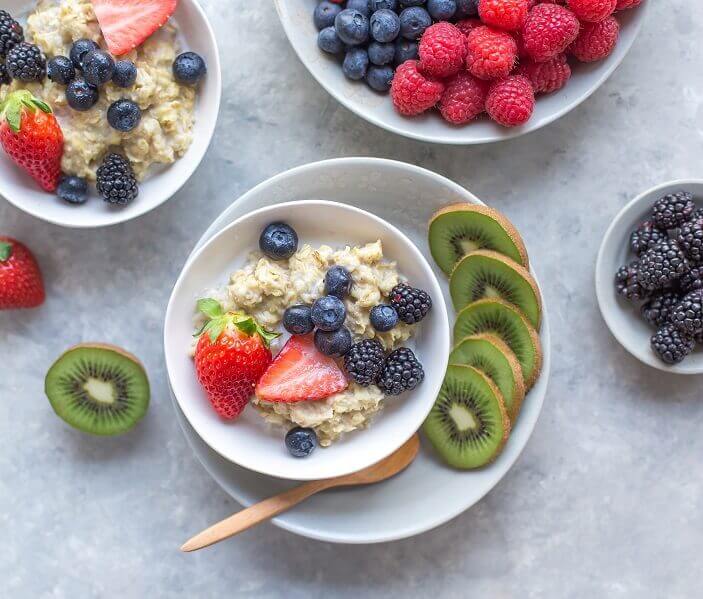4 mins read
Nutrition Tips for Women

- What Vitamins & Minerals Are Key For Women’s Health?
- How Much Fat, Protein & Carbohydrates Do Women Need?
- Fertility
Many women look to take steps to improve their health, but it can be hard to know what nutrients women specifically need to stay healthy.
In this article, we take a look at key vitamins and minerals for women, as well as the level of fats, carbohydrates and proteins women need in their diets.
What Vitamins & Minerals Are Key For Women’s Health?
Just like men, women need to eat a healthy, balanced diet to keep their bodies functioning effectively. But there are specific micronutrients (vitamins and minerals) women need to stay healthy, in particular:
- Calcium, B12 and Vitamin D: Women transitioning towards the menopause need to ensure they are getting their daily requirements of calcium, vitamin B12 and vitamin D. These are vital for bone health and women who are post-menopausal are more likely to suffer from osteoporosis.
- Folate or Folic Acid (B9): Women looking to get pregnant or are in the early stages of pregnancy may need a folic acid supplement.
- Iron: Iron is particularly important for menstruating women especially those who have heavy periods.
How Much Fat, Protein & Carbohydrates Do Women Need?
Women tend to be smaller in size than men, have an increased percentage of body fat and less muscle which is reflected in their macronutrient intake (carbohydrates, proteins and fats).
Generally, men need more calories than women, but it is also based on individual build and physical activity levels, so finding your own personal balance is key.
1. Fats
Fat is used by the body as an energy source, often as an emergency. Women can oxidise essential fatty acids better than men. However, guidelines state that women need less fat in their diet than men.
Fat Metabolism
We know there are distinct differences in fat metabolism between both genders because women burn more fat during exercise but don’t lose as much body fat. Therefore, suggesting that women store fat more efficiently than men.
Fertility
There is emerging evidence which suggests that some types of dietary fat are linked to improved fertility in women. Some studies have found that an increase in total fat intake, particularly polyunsaturated fats, in women, is associated with a greater total and free testosterone levels and may even prevent amenorrhoea (lack of periods).
However, it doesn’t mean women need to increase or exceed their reference nutrient intake of fat, just that it should be included as part of a healthy, balanced diet – ensuring more polyunsaturated and monounsaturated fats and less saturated fats in your diet.
2. Carbohydrates
Carbohydrates are the body’s main source of energy. However, as women tend to burn more fat and fewer carbohydrates during exercise, they should avoid eating a carbohydrate-heavy meal immediately after exercise.
Studies have also found that women need fewer carbohydrates and more fat in their diet due to the hormonal shifts they experience during their lives.
Women should ensure they eat starchy high-fibre carbohydrates.
3. Protein
Protein helps to maintain the structure of our cells, hair, bones and connective tissue. They also help to make enzymes which digest our foods, as well for antibodies that your immune system needs to fight infections.
Women aged between 19 and 50 should eat 45g of protein per day, that is equivalent to approximately 0.75g of protein per kilogram of bodyweight. Pregnant and breastfeeding women need more.
You can work out just how much protein you need by multiplying your body weight in kilograms by 0.75g, so a female weighing 60 kilograms requires 45g of protein per day.
What Are The Daily Reference Intakes For Women?
Reference intakes are the measures used on the nutrition labels of packaged foods and are a guide for the amount of energy and specific nutrients that need to be eaten by men and women to maintain a healthy diet. They are not designed to be targets but instead give you an idea of how much energy you need as well as how much protein, fat, sugar and salt you need.
They are based on an average-sized woman who completes an average amount of physical exercise. Hence, why they should only be used as a guide.
| Men | Women | |
| Calories | 2,500kcal | 2,000kcal |
| Protein | 55g | 50g |
| Carbohydrates | 300g | 260g |
| Sugar | 120g | 90g |
| Fat | 95g | 70g |
| Saturates | 30g | 20g |
| Salt | 6g | 6g |
Source: BBC Good Food
As you will see there are differences in the nutritional needs according to the reference intakes between men and women. Men tend to need more calories because they are larger in both height and weight and have a higher muscle mass than women. That’s also true in the case of macronutrients, but when it comes to micronutrients, women’s needs are usually higher than men’s.
Conclusion
It is important to remember that female physiology is different to men and, therefore, women’s nutritional needs will differ. It is important that women are aware of the role micro and macronutrients play and to ensure they are incorporating these in the right quantities as part of a healthy balanced diet.
- Health scores calculated
Close
Article references
-
Duarte, G, R et al. (2017). Benefits of Dietary Fibre to Human Health: Study from a Multi-Country Platform. Nutrition and Food Science: 47(5), pp 688-699.
-
Kling, J, M et al. (2014). Osteoporosis Prevention, Screening, and Treatment: A Review. Journal of Women’s Health: 23(7).
-
Leblanc, V et al. (2015). Differences Between Men and Women in Dietary Intakes and Metabolic Profile in Response to as 12-Week Nutritional Intervention Promoting the Mediterranean Diet. Journal of Nutritional Science: 4(13).
This information has been medically reviewed by Renee Mcgregor
Renee is a registered dietician with 20 years' experience working in clinical and performance nutrition. She is the author of best-selling books 'Training Food', the 'Fast Fuel' series and 'Orthorexia, When Healthy Eating Goes Bad'. Renee is regularly called upon as an expert contributor to many national publications, as well as radio and TV, including Newsnight and BBC 5 Live. As well as being the nutritional lead for Forth, Renee works with a number of national governing bodies, including Scottish Gymnastics, The GB 24 hour Running Squad and The England Ballet company.

Renee Mcgregor
Nutrition Lead
Related articles
Like this article? Here are some more based on similar topics.





